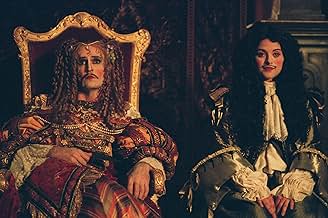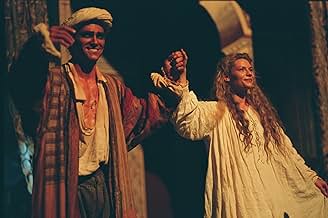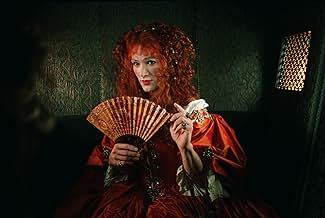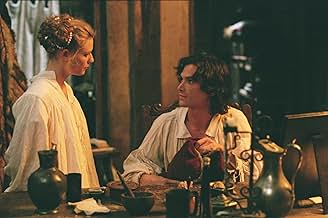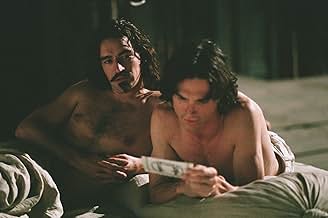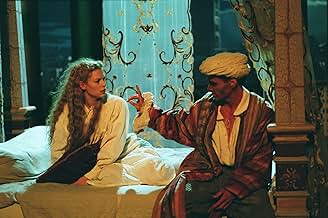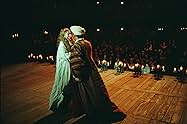Füge eine Handlung in deiner Sprache hinzuA female theatre dresser creates a stir and sparks a revolution in seventeenth century London theatre by playing Desdemona in Othello. But what will become of the male actor she once worked ... Alles lesenA female theatre dresser creates a stir and sparks a revolution in seventeenth century London theatre by playing Desdemona in Othello. But what will become of the male actor she once worked for and eventually replaced?A female theatre dresser creates a stir and sparks a revolution in seventeenth century London theatre by playing Desdemona in Othello. But what will become of the male actor she once worked for and eventually replaced?
- Auszeichnungen
- 4 Gewinne & 1 Nominierung insgesamt
Empfohlene Bewertungen
This movie gives us a glimpse of how theatre functioned in England up to the times of Charles II. The female roles of all plays were portrayed by male actors. The school of acting in that era was an artificial one where actors relied in gestures and affectations that would be laughable today in a serious drama, but that was the way it was the accepted Method then, nothing to do with Stanivslaski, or Strassberg.
The leading figure of that theatrical world was Ned Keynaston, who was the most famous Desdemona of his time. There must have been a lot of gay men that were attracted to that world, as was the case with Mr. Keynaston, who might have been bisexual, although that comes as a secondary subplot. This actor is greatly admired by all, including the dressing assistant, Maria. This girl loved to be in the theatre, but could not, because only men were allowed. So instead, she goes to a second rate company that puts on plays in a pub and emerges as Margaret Hughes, an actress in her own right who will challenge Keynaston's Desdemona and makes that role, her signature role as well.
Claire Danes, as Maria, or Margaret Hughes, has never been better! She shines as the girl whose ambition is to be on stage. She is wonderful in the part. Ned, played with gusto by Billy Crudup, shows an unexpected range, although he has done theatre extensively. Both of these actors takes us back to London and make us believe that what we are watching.
A glorious English cast behind the two American principals are gathered to play effortlessly the theatrical figures of the time, and also the King and his court. Ruper Everett, as King Charles II, is hilarious. The scene in which he plays in drag with his mistress, Nell Gwynn, is one of the best things of the movie. Also, Richard Griffith, as lecherous Sir Charles Sedley, gives a stellar performance. Ben Chaplin, as the Duke of Buckingham, reveals the ambiguity of the men that were attracted to those early thespians.
Thoroughly enjoyable because of Richard Eyre's direction and eye for detail.
Ned Kynaston (Billy Crudup) is the greatest actor and the most beautiful "woman" of the English stage. He played several women's part and his most famous is the role of Desdemona in William Shakespeare's Othello. He is studied, admired, loved, and envied by his dress keeper, Maria (Claire Danes). She watches from the wings and longs to act and she does so behind Kynaston's back and in low pubs before a royal official, the Duke of Buckingham (Ben Chaplin). Then the chain of events unfold as Maria is introduced to Charles II (Rupert Everett) and his mistress Nell Gwyn (Zoe Tapper) who then declares that women will be given the freedom to perform in theater.
As Maria's fame rises and women are playing more and more of the female roles, Ned Kynaston (the last of his kind of actors) is casted aside. As an actor and as man, Kynaston had learned to suppress all masculinity in order to gain the grace and beauty of a woman. He knows only how to portray women and he is lost in learning to play male roles. But then again Maria is unable to play the role of Desdemona as a real woman. Both Kynaston and Maria fall in love and into passion as they learn from each other their own sexual identities and to channel their femininity and masculinity.
I fell in love with the film's story and with the performances of Billy Crudup and Claire Danes. As Kynaston, Crudup reveals vulnerability and strength as a man who discovers himself as a man (and a very hot one at that) through the role and eyes of being a woman. As Maria, Danes is beautiful and real: those tears are real! She can cry on cue and with the heartbreak of a real woman in love and envious of the man she loves. Maria is a strong, forthcoming, and in way a modern actress ahead of her time. She is not an "Eve" from All About Eve, she is a Viola Delesop from Shakespeare In Love, but real. The love scene between Danes and Crudup is sexy, tender, and passionate showing that explicit sex and nudity is not always necessary. They look into each other's sides and truly learn from each other as man and woman.
This is a highly recommended film for those who love acting, period pieces, or just if you want to see a really good film, "Stage Beauty" is very much the film to watch.
Don't expect an elegant historical romp from Stage Beauty; it's much more than that. Director Richard Eyre (Iris) and screenwriter Jeffrey Hatcher have loosely interpreted true events to deliver a passionate, romantic journey of gender-bending self-realisation set in the bawdy world of the British Restoration, circa 1660.
In a time when women are banned from acting on stage, King Charles II is on the throne, accompanied everywhere by his vulgar but merry mistress, Nell Gwnn. Meanwhile Ned Kynaston (Billy Crudup) is the most celebrated leading lady of his time. He is adored by his audiences, by his lover and patron the Duke of Buckingham, and secretly loved by his dresser Maria (Claire Danes). But when aspiring actress Maria's illegal performance as Desdemona in Othello triggers royal permission for women to act on stage, Kynaston's fall from grace is swift.
This is an actors' film, where the talents of Danes and in particular, Crudup, shine. (Their remarkable relationship triggered an off-screen romance.) Crudup is taut as the bisexual Kynaston, trained to be a calamity and actress since early adolescence, and emotes powerfully as he struggles with his sexuality and identity in an unfriendly new political landscape. He is alternately a catty drag queen, angry young man and committed thespian, without ever straying beyond credibility. In contrast, Danes is luminous but unsure as Maria. A talented supporting cast includes Rupert Everett, providing comic relief as the languid King, while Ben Chaplin is sensual as the self-serving Duke.
Stage Beauty has been compared to Shakespeare in Love, but although it's less successful, it's far less contrived. Although Stage Beauty is a love story, you don't know how things will resolve. The pace is less brisk than in a more manufactured film, but it's also more realistic, enhanced by production design and costuming which depicts both the grit and the sumptuousness of the time.
While at first the on stage acting grates, it is deliberate. As Stage Beauty progresses, the acting technique evolves to resemble 19th Century Naturalism not true to life, but faithful to the emotional journey of the characters. It's a special film that will take you on an emotional journey too.
**** out of ***** stars.
I agree that Claire Danes acted well (though the hyperventilation happened once too often) and Billy Crudup brought a complexity to the role that I rarely see in films. The reference to Shakespeare in Love is an affectionate comparison: I enjoyed the light snack of Gwinny, luvvies and Fiennes and have sat through the DVD time and again. But that film had a predictability that Stage Beauty lacked. We didn't know that Stage Beauty's 'love element' would ever work out.
I do not see the development of the relationship between Danes and Crudup as a conversion from gay to straight. Instead I see a problematic progress from an imposed gender identity (perpetuated through sexual fantasy by Buckingham) to an un"knowing" but more satisfying state, where it's being yourself (whatever that is) not performing a role that counts. I think that this is relevant to all of us as we perform the roles that we and those who've influenced our upbringing have created for ourselves. We can't easily escape them (and some are more hammy than others in their performance) but the knowledge that life is performative and complex is, for me, liberating.
And all that from a costume drama!
Wusstest du schon
- WissenswertesClaire Danes and Billy Crudup became a couple after the filming of this movie. Crudup left his long-time girlfriend Mary-Louise Parker for Danes.
- PatzerNed Kynaston, age 20-something, says that he's been playing women on stage for half his life, since he was a child. But at the royal banquet, the King says that the theatres have only recently reopened after an 18-year shutdown caused by the Puritan takeover.
- Zitate
King Charles II: Why shouldn't we have women on stage? After all, the French have been doing it for years.
Sir Edward Hyde: Whenever we're about to do something truly horrible, we always say that the French have been doing it for years.
Top-Auswahl
- How long is Stage Beauty?Powered by Alexa
Details
- Erscheinungsdatum
- Herkunftsländer
- Offizielle Standorte
- Sprache
- Auch bekannt als
- Compleat Female Stage Beauty
- Drehorte
- Produktionsfirmen
- Weitere beteiligte Unternehmen bei IMDbPro anzeigen
Box Office
- Bruttoertrag in den USA und Kanada
- 782.383 $
- Eröffnungswochenende in den USA und in Kanada
- 38.654 $
- 10. Okt. 2004
- Weltweiter Bruttoertrag
- 2.307.092 $
- Laufzeit1 Stunde 46 Minuten
- Sound-Mix
- Seitenverhältnis
- 2.35 : 1
Zu dieser Seite beitragen




